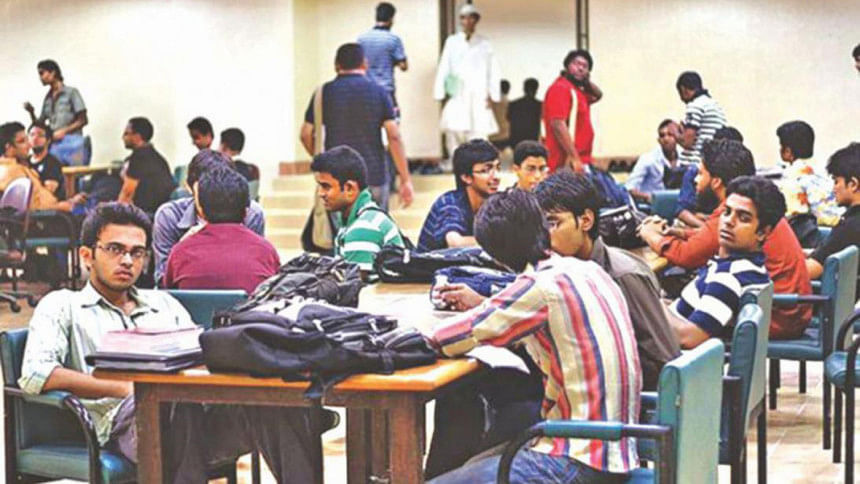Setting our priorities straight

When job seekers look for new employees, they need a system to filter out the best candidates. Indicators of potential or skill are a key component. Nobel prize winning Economist Michael Spence refers to such indicators as "signals". The signals that job-givers rely on in selecting their workforce should be in sync with the education system, meaning that the education each student attains should equip them with skills that will become good "signals". This is where the matter of skill mismatch comes in, sadly revealing the reality that our education system is not grooming our students to send out the signals they should be able to. This is one aspect of why we have an alarming rate of graduate unemployment. However, the issue runs deeper than we realise.
When an education fails to properly prepare students for the job market, the signals that employers use to pick out students coming from that education system becomes completely unreliable. For example, academic excellence is a signal that employers look out for. In our education system, academic excellence is mainly measured by the GPAs, CGPAs we get from SSC, HSC and university. I must leave out the English medium stream students for now—there is a chance that their academic excellence indicators are much better than ours. For Bangla medium and Madrasah medium students, the marks, grades and GPAs we get become the whole focus of our education because this is how academic excellence is defined in our institutions. I believe the way we measure academic excellence with so much weight on CGPAs is a problem, because, simply put, it has no credibility—not anymore. Do all students with high CGPA shine as brightly in their work life? Is a high CGPA able to ensure quality in a student?
When the exams we use for assessing a student is based on memorisation, copy-pasting onto exam scripts from the book without any practice of analytical ability, critical thinking, creativity—the marks that student acquire in the exams cannot be considered an indicator of excellence. We have got to accept the fact that getting good grades in our system cannot and should not constitute being a "good student". Not only does this flawed measure of academic excellence result in unreliable "signals", but it also has a very dangerous by-product called "demotivation". I know for a fact that in our system at all three levels of school, college and especially university, if a student does not have a high CGPA, then they are considered "bad or below average students". This is a huge reason behind scores of student today being demotivated and depressed. These students are not judged by the knowledge, skill or potential they might have but for the grades they achieved through our undependable exam and assessment system. Often, these students are meant to believe that they will never be able to reach any goal or position in their careers. They are simply robbed of any dreams they could have for themselves. I fear that someday—maybe not too far away—this is what is going to bring us even more darkness then we are already emerged in. If our young generations do not have aspirations—if we rob them of that—then we should prepare for the worst because no matter how high our GDP growth is, we are going to be stuck in a deep hole of darkness and we will have no way out of it.
What matters most in our education is the CGPA we get. Am I saying this is wrong? Yes, I am. Until we can gear our education system—our curriculum, textbooks, pedagogy, institutions—and our approach to education to be oriented with the skills that should matter—analytical skills, critical thinking for example—we should not put so much weight on CGPA as a measure of academic excellence. Until we can create a system in which a student can write a poem on their own instead of memorising one by Kazi Nazrul Islam, can think and write about how to apply theories instead of memorising the paragraphs in the textbook, can build an argument instead of "briefly discussing" ones made by others, GPA and CGPA should not matter so much.
What should matter then? Well, I believe we should lessen the weight we put on academic records and give weight to students' engagement in extra-curricular activities, to start with. When a student pursues activities like sports, debating, writing, quizzes, learning to play an instrument, learning a new language, it has to, in some way or the other, give them exposure to the larger world outside their classrooms and this often helps to bridge what they learn inside the classroom to what they observe outside. With broadened horizons, these students can develop their potential and aspire to bring about positive changes if only they are given the platform; if only we believe in them and not throw them aside because they have lower CGPA. I dream of the day that not only extracurricular activities, but also community service will be a part of our student assessment system. If I could, I would declare and implement a policy that would entitle ten-twenty marks, or perhaps a mandatory twenty-hour service, being assigned to community service in handing out GPAs and CGPAs. Be it cleaning up the environment, planting trees, serving time in hospitals, teaching in local schools—I believe giving substantial weight to social work and community service at school, college and university levels could bring about the massive change in priorities that we need.
I am a university teacher and I teach—try to teach—economics. I was a student of the same department. For years, as a student and now as a teacher, I struggle to believe that a high CGPA is an accurate predictor of success. Believing in this means that my students who have lower grades don't have much hope in life. But the evidence in front of me simply suggests otherwise. I see so much potential in my students every day and the promise they show most often has very little to do with those grade point averages we usually judge them by. It's only been a year that I have been teaching here and I cannot count the times a student has come up to me with creative ideas and stimulating thoughts on something I was teaching in class and has said, "I don't have a good result, Madam". Not everybody will attain the best grades, not every student is meant to be first, second and third. What do we expect from the rest of the students in our classrooms? What we expect from them matters in what they aspire to do with their careers and lives.
If the purpose of education is the first thing we should address, aspirations should be the second. The Department of Economics, University of Dhaka is proud to finally address these issues as we observe "Aspiration Week" from November 7 to 14. It's time to inspire our students to dream better dreams and to aspire not only to get high salaries but to use their degrees and knowledge to contribute in some way to the society, country and to knowledge. Experience is our strongest evidence and so we have invited the most experienced and respected people from different sectors—many of them from our department—to come and share their stories of struggle, their definitions of success, their aspirations from when they were students, how they fulfilled their aspirations and what they believe are the most important skills students should aim to acquire. It is not enough anymore to tell students to study, it has become paramount that we also guide them in understanding why. It is time to value passion more than aptitude, humanity more than brilliance. As we dedicate this week to the importance of aspirations, we invite departments and universities throughout the nation to follow and start the much-needed conversations about students' career aspirations and dreams. If we teach our students to reach for the stars, some of them will at least touch the sky and maybe, just maybe, some might even discover a new constellation.
Rubaiya Murshed is a lecturer at the Department of Economics, University of Dhaka.

 For all latest news, follow The Daily Star's Google News channel.
For all latest news, follow The Daily Star's Google News channel. 



Comments